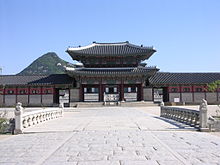Jeong Do-jeon
| Korean spelling | |
|---|---|
| Hangeul | 정도전 |
| Hanja | 鄭 道 傳 |
|
Revised Romanization |
Jeong Do-jeon |
|
McCune- Reischauer |
Chung Dojun |
Jeong Do-jeon (* 1337 ; † August 26, 1398 ) was a Korean politician of the Goryeo Dynasty and Joseon Dynasty , a neo-Confucian philosopher and writer.
Life
Jeong came from a noble family, the son of a high government official. He was closely associated with Taejo , the first king of the Joseon dynasty . As a Neo-Confucian he envisioned a Confucian state with the trinity of monarch, officialdom and people. In this way, he was able to carry out radical reforms in the early 14th century and create the economic and political basis for the new, 500-year-old Joseon era. He is therefore considered to be the founding father of the Joseon Dynasty.
When Taejo moved the capital Kaesŏng to Hanyang, today's Seoul , in 1394 , Jeong was responsible for the implementation and was the architect of Gyeongbokgung [kjəŋp'okk'uŋ], the first and largest of the Five Great Palaces , which was completed in 1395.
In 1397 Jeong's political thoughts and teachings were compiled into the "Gyeongguk Daejeon", which became known as the "Great Law Book for Guiding the Nation". A year later he was assassinated.
His literary name was Sambong (삼봉, 三峯).
Fonts
Title romanized:
- Sambongjip (삼봉 집, 三峯 集)
- Joseongyeonggukjeon (조선경 국전, 朝鮮 經 國 典)
- Gyeongjemungam (경제 문감, 經濟 文 鑑)
- Gyeongjeuiron (경제 의 론, 經濟 議論)
- Bulssijapbyeon (불씨 잡변, 佛氏 雜 辨)
- Simmuncheondap (심문 천답, 心 問 天 答)
- Simgiri (심기 리, 心 氣 理)
- Hakjajinamdo (학자 지남 도, 學者 指南 圖)
- Jinmaekdogyeol (진맥 도 결, 診脈 圖 結)
- Goryeoguksa (고려 국사, 高麗 國史)
- Sangmyeongtae Iljesanbeop (상 명태 일제 산법, 上明 太 日 諸 算法)
- Jinbeop (진법, 陣法)
- Daemyeongryuljikhae (대명률 직해, 大 明律 直 解)
literature
- Jae-eun Kang, Suzanne Lee: The land of scholars: two thousand years of Korean Confucianism. Paramus . Homa & Sekey Books, New York 2006, ISBN 1-931907-30-7 .
- Han Yeong-u: Jeong Do-jeon's philosophy of political reform. In: Korea Journal 14 (7-8) 1974. Reprinted in: Korean philosophy: Its tradition and modern transformation. Edited by Korean National Commission for UNESCO. Hollym, Elizabeth, NJ 2004, ISBN 1-56591-178-4 , pp. 55-74.
- 강좌 한국 철학 . Yemoon Seowon, Seoul 1995, ISBN 89-7646-032-4 , pp. 333-345. (Gangjwa Hanguk Cheolhak, Korean Institute of Philosophical Thought. Guide to Korean philosophy ), Korean.
See also
Web links
- Jeong Do-jeon (Korean)
- Jeong Do-jeon (Korean)
Individual evidence
- ^ Jeong Do-jeon - founding father of the Joseon Dynasty. In: KBS World , August 20, 2010 , accessed May 18, 2012.
- ↑ Jang Jiyeon: The Palace Culture of Joseon and the Gyeongbok-gung. In: Koreana. Winter 2010 , accessed May 18, 2012.
| personal data | |
|---|---|
| SURNAME | Jeong, Do-jeon |
| ALTERNATIVE NAMES | 정도전 (Hangeul); 鄭 道 傳 (Hanja); Chŏng, Tojŏn (McCune-Reischauer); Jeong, Do-jeon (revised Romanization); Sambong (writer name) |
| BRIEF DESCRIPTION | Korean politician and neo-Confucian philosopher |
| DATE OF BIRTH | 1337 |
| DATE OF DEATH | August 26, 1398 |
